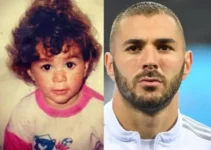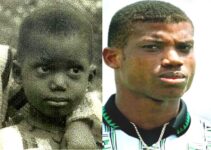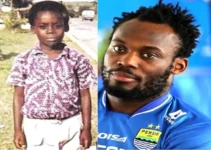The name Rivaldo might not be mentioned as frequently today, despite him being a Ballon d’Or winner and the mastermind behind Brazil’s 2002 FIFA World Cup triumph. Rivaldo earned the nickname “The Complete Package” because he truly had it all—his impressive height, combined with remarkable agility. He was a dead-ball specialist, celebrated for his bending free kicks and pinpoint penalties, and had a knack for scoring from long range with powerful strikes.

Humble Beginnings Unveiled: The Inspiring Story of Rivaldo’s Rise from Poverty to Football Greatness
However, beyond the fame and accolades lies a story of humble beginnings marked by severe poverty. Rivaldo, the former Barcelona number 10, endured a tough childhood where malnutrition left lasting effects on his body. Even as an adult, the scars of poverty were visible. His bowlegged appearance during his playing days was a result of childhood malnourishment, and he lost several teeth due to a lack of proper nutrition growing up.
Rivaldo’s journey is not just about football glory—it’s also a painful narrative of struggle and loss. His father, Romildo, who made countless sacrifices for him, tragically died in a car accident in 1989, just after Rivaldo signed his first professional contract. It was a devastating blow at a time when Rivaldo had hoped to repay his father for everything he had done.
In this biography, we’ll explore Rivaldo’s journey from poverty to becoming one of football’s greatest talents. Now, without further ado, let’s dive into the heart of this remarkable story.
Rivaldo’s Childhood Story – Early Life and Family Background:
For Biography starters, Rivaldo Vítor Borba Ferreira, AKA Rivaldo, was born on the 19th day of April 1972 in Paulista, Pernambuco, Brazil. He was born to his mother, Marlúcia Salomão Borba, and father, Late Romildo Ferreira.

Behold the Football Legend Rivaldo in his childhood days.
Rivaldo was born in abject poverty and had a painful upbringing in the Brazilian Favela slum. This is a low-income area in Brazil characterized by stark poverty among its inhabitants.
The Football Legend’s physical appearance still marks the poverty he experienced in his childhood. This is pictured below as a sign of it.
Back then, malnourishment caused bow-leggedness in him, which still remained when he turned adult. Rivaldo was known to have also lost several teeth, which got delayed as a result of chronic malnutrition in his childhood time.

Events of his Early Years:
Tragically, Rivaldo’s father, Romildo Ferreira, was killed in a road accident in 1989. Romildo had always encouraged his son to pursue his footballing dream, and his death was a massive personal blow to Rivaldo, who was planning to begin his professional career at that time. Rivaldo, however, began his career and fought hard to overcome both personal loss and his doubters, who always labelled him ‘weak and malnourished.’
He became a professional footballer the same year his dad died. Little is known of Rivaldo’s mum, who is known as Marlúcia Salomão Borba. Reports reveal she has been a housekeeper all her life. As for his siblings, Rivaldo has two brothers named Ricardo Vítor and Rinaldo Borba Ferreira. Also, a sister named Cristiane Ferreira Diniz.
Like many Legends before him, the likes of Roger Milla, the Great Pele and Maradona, Rivaldo found in football a beautiful game he loved and a hope for his salvation. However, the hardship of his childhood almost ruined his dreams.
Rivaldo never gave up. He maintained the determination to succeed as a major footballer despite the doubts of coaches who feared that his legs were too bow-legged and his body frail to withstand the rigours of football. Despite hearing these words, he still succeeded in becoming one of football’s top 100 greats.
Rose Ferreira and Rivaldo’s Story:
The soccer legend was previously married to his first wife, Rose Ferreira, for ten years which spanned from 1993 to 2003. His marriage was filled with controversies as he was severely accused of being a cheat.

Meet Rivaldo’s first wife, Rose Ferreira.
It was reported that Rose Ferreira walked out of their marriage after a cheating scandal that plagued Rivaldo. The former World Best was dating two girlfriends at that time who came into his life after he got so much fame in football.
This caused a marriage separation and divorce. Rose became the mother of two of his children (son Rivaldinho and daughter Thamirys). They are pictured all grown up below;
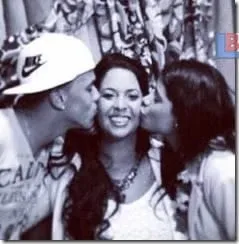
At the time of the divorce, when both kids were very young, Rose took them back to Brazil from Milan, where her ex-husband played. This made Rivaldo leave the Milan environment with one of his girlfriends. He finally settled in Greece to play for Olympiacos.
Unfortunately, Rivaldo’s ex-wife is dead. The reason for death is currently unknown. Rivaldo revealed this news in an Instagram post on 14th January 2015.
Eliza Kaminski Ferreira:
After their divorce, Rivaldo went to play for Greece, taking one of his two girlfriends. This time, it was the one he loved the most.

Rivaldo claimed he found a greater love with Eliza Kaminski Ferreira.
The one that loved shaving his hair. The chosen woman became the beautiful Eliza Kaminski Ferreira.
She took very good care of him, as seen in the photo. This made Rivaldo marry her. He also gave her a big stake in the Brazilian club he owned.
Immediately after their marriage, it was announced that Eliza was appointed by her husband as the vice president of his football club, Mogi Mirim.
Note: Rivaldo owned and also played for this club, even at the age of 43. Still, on the appointment, Rivaldo made Eliza replace Wilson Bonetti, who was a prosecutor for 20 years and his lawyer, who has fought all his legal battles, including that of his ex-wife.
More so, according to online records, Eliza was also appointed as a stakeholder of another football club named R10 Soccer School, LLC, which is still owned by her husband.
With his lovely Eliza Kaminski Ferreira, Rivaldo fathered two sons (João Vitor Ferreira and Isaque Ferreira) and two daughters, namely Thamirys Borba Ferreira and Rebeca Rebeca Ferreira. Below is a picture of his family.

Rivaldo Biography Facts – Making History:
Did you know?… Rivaldo made history as the only father ever to play together with his son (from his late ex-wife), and both surprisingly scored in the same game and in his club.

Indeed, for the first time in the history of football, three generations of the Rivaldo family were attached to the game against XV de Piracicaba as the match took place in the Estadio Romildo Ferreira, a stadium named after Rivaldo’s father.
The Rivaldo family has indeed etched their names in the soccer history books and, of course, the Guinness Book of Records.
Note: The Brazilian legend was 43 (pictured above) at the time he came off the bench for Mogi Mirim in a Sao Paulo State League match to join his 20-year-old son on the pitch.
Rivaldo Biography Facts – Issue with Val Gaal:

In 1999, Rivaldo was at the peak of his career and also won the Ballon d’Or the same year. The Brazilian and Barca Legend suggested to his then-coach, Van Gaal, that he should play behind the striker and move from his usual left-wing position. This did not go down well as Van Gaal questioned his audacity to teach him his job. This resulted in Rivaldo being benched for several games by Van Gaal.
Note: Rivaldo was the world’s best footballer at that time. The pair, who were once friends, later became enemies. Van Gaal was once accused of physically confronting Rivaldo during a training session, as shown in the picture below. This made Rivaldo request a transfer to AC Milan.

From Friends to Enemies- The Story of Rivaldo and Van Gaal.
The Spanish press constantly disapproved of the Dutchman’s decision to bench Rivaldo. When Van Gaal left Spain for the first time, the media, including Rivaldo, celebrated his departure. You might find it intriguing that during that period, José Mourinho was serving as Louis van Gaal’s assistant coach at FC Barcelona. At the same time, Luis Enrique and Pep Guardiola were still playing for the club. Meanwhile, Andrés Iniesta was developing his skills in La Masia, Barcelona’s renowned academy, and Lionel Messi had yet to make his way to the academy.
Controversy:
Rivaldo won the World Cup in 2002 with Luiz Felipe Scolari’s men. His winning was dogged by controversy when he got Turkey’s Hakan Unsal sent off after pretending to be hit in the face by the ball when it had been thrown at his thigh.
Rivaldo Biography Facts – Career Summary:
Just like Didier Drogba, Rivaldo never played any youth football. He was also a late starter in his career. He started playing football in 1991 at the age of 19. Between 1991 and 1993, Rivaldo played for Santa Cruz, Mogi Mirim, and Corinthians.
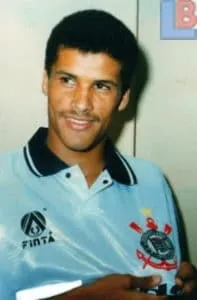
In 1994, Rivaldo made a pivotal move by switching allegiances to Palmeiras, where he played a key role in helping the team defend its league championship that same year. Before the 1996 Olympics, Parma announced they had signed Rivaldo and his teammate Amaral from Palmeiras. However, after a post-Olympics dispute, Rivaldo chose to move to Spain instead of Italy, joining Deportivo La Coruña in La Liga.
In 1997, Rivaldo made a high-profile switch to FC Barcelona in a record transfer, earning Deportivo a transfer fee of approximately 4 billion pesetas (around $26 million). In his debut season with Barcelona, Rivaldo played a pivotal role in securing the Double for the club, winning both the La Liga championship and the Copa del Rey.
His individual brilliance continued to shine, and in 1999, he, who played alongside Patrick Kluivert (Justin Kluivert‘s Dad), added another La Liga title to his achievements. That same year, Rivaldo’s exceptional performances earned him the prestigious titles of FIFA World Player of the Year and the Ballon d’Or, solidifying his status as one of the best players in the world.
However, despite his success at Barcelona, a disappointing Champions League campaign and personal issues, particularly marital problems, prompted Rivaldo to leave the club in 2002, when he moved to AC Milan.
Post-Barca Years:
In early 2004, Rivaldo made the decision to return to Brazil, influenced by coach Vanderlei Luxemburgo, who persuaded him to turn down several European offers. However, his time there was brief, with just 11 games and two goals to his name.
On July 22, 2004, Rivaldo made his way back to Europe, signing with Olympiacos, where he found success, scoring 43 goals in 81 matches. Despite his contributions, he was released after a disagreement with the club’s chairman, who felt Rivaldo was too old to continue playing for the team.
Following his departure, Rivaldo played for a series of smaller clubs before eventually venturing into club ownership. And the rest, as they say, is history.
What Rivaldo is remembered for:

- We remember Rivaldo for his extraordinary (and expensive) left foot.
- For being among the best in the long line of Brazilian magicians.
- We remember Rivaldo for his combination of speed, lethally precise shooting and creative dribbling.
- For being able to solve a bad game in one minute.
- We remember Rivaldo for being a problem player. A very hard person on salary negotiations.
- For being a dead-ball specialist, Rivaldo was renowned for his bending free kicks and penalty-taking.
- We remember Rivaldo for his bicycle kicks and Golden Left Foot. I bet you remember this photo very well. 🙂

Do you remember this goal?
Rivaldo earned a place among the prestigious ‘FIFA 100,’ a list of the greatest living Ballers compiled by the late Bazilian Icon Pele. Notable names in that list included the likes of Thierry Henry and Roy Keane. Alongside icons like Ronaldinho and Michael Owen, Rivaldo is remembered for his well-deserved Ballon d’Or victory. His remarkable contributions to football have solidified his legacy, ensuring his name is forever etched in the sport’s most celebrated history books.
Final Note:
From his poverty-stricken childhood in Brazil, where malnutrition left lasting marks on his body, to becoming one of the world’s best footballers, Rivaldo’s story is nothing short of inspirational. Despite personal hardships, including the tragic loss of his father just as his career began to soar, Rivaldo overcame life’s odds to win the Ballon d’Or, lead Brazil to World Cup glory, and leave a lasting legacy in world football. His legacy is not just about his skill on the pitch but also his perseverance off it, making him a true symbol of overcoming adversity.
